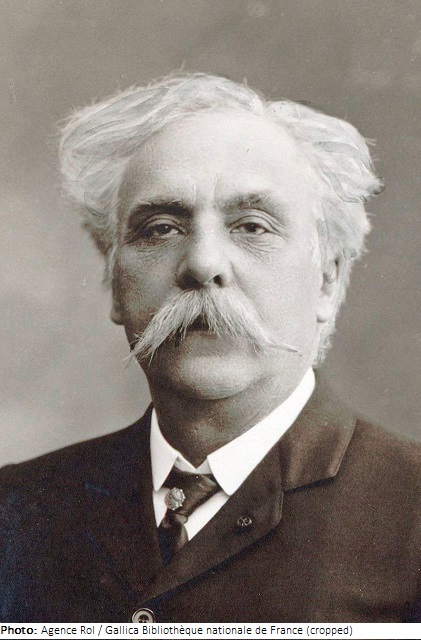
| Roles | Referee |
|---|---|
| Sex | Male |
| Full name | Gabriel Urbain•Fauré |
| Used name | Gabriel•Fauré |
| Born | 12 May 1845 in Pamiers, Ariège (FRA) |
| Died | 4 November 1924 (aged 79 years 5 months 23 days) in Paris XVIe, Paris (FRA) |
| NOC |  France France |
Gabriel Fauré’s musical talent was discovered by his father, who took him to study in Paris. There, Camille Saint-Saëns (1835-1921), amongst others, trained him thoroughly in composition. In 1866, Fauré went to Rennes as organist at the church of St.-Sauveur. With the beginning of the Franco-Prussian War, he enlisted in the light infantry. In the following years, he was organist at various churches until Saint-Saëns brought him to the church La Madeleine as assistant organist and later as choirmaster. Eventually, he became chief organist in 1896.
That year Fauré was also appointed professor of composition at the Paris Conservatoire. His students included Maurice Ravel, George Enescu, Charles Koechlin, Florent Schmitt, and Nadia Boulanger. 1905-20, Fauré was director of the Conservatory until he became ill with an ear ailment that led to gradual hearing loss. Although he initially tried to hide it, he eventually had to give up teaching. From 1903-21, he also wrote music reviews in the daily Le Figaro. In 1909, he was elected as member of the Académie des Beaux Arts and the following year was appointed Commander of the Legion of Honor. Fauré died from pneumonia just months after the end of the 1924 Paris Olympics.
As a composer, Fauré developed a musical language of his own, incorporating influences from French and German Romanticism. By using mild dissonance and special coloristic effects, he anticipated Impressionist practices. While preserving harmony, he especially developed the art of composition. In his piano works, he renounced virtuosity in favor of the classical clarity of the 18th-century French masters. The precise melodic line of his songs is in line with the tradition of French vocal music. He wrote operas (Pénélope), orchestral works, chamber music, and songs. Especially his Requiem and his Élégie for Cello and Piano have found their way into the general repertoire.
| Games | Sport (Discipline) / Event | NOC / Team | Phase | Unit | Role | As | |
|---|---|---|---|---|---|---|---|
| 1924 Summer Olympics | Art Competitions |  FRA FRA |
Gabriel Fauré | ||||
| Music, Open (Olympic) | Final Standings | Judge |